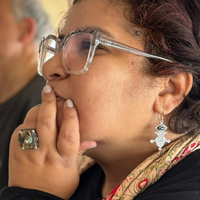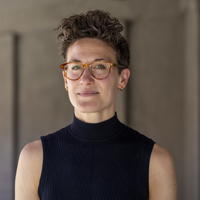
Sana Benbelli
Professeure de Socio-anthropologie
less
Related Authors
Abdallah Zouhairi
Hassan II University of Casablanca
Rebecca Savory Fuller
Arts University Bournemouth
Safaa Monqid
Université Paris III - Sorbonne Nouvelle
Abdullah Addas
Prince Sattam Bin Abdulaziz University
John Minnery
The University of Queensland, Australia
Casper Laing Ebbensgaard
University of East Anglia
Vanessa Paloma Elbaz
University of Cambridge
Friederike Landau-Donnelly
Dortmund University of Technology - Technische Universität Dortmund
Mahmood I . Albrifkany
Eastern Mediterranean University
InterestsView All (9)









Uploads
Papers by Sana Benbelli
On the one hand, families are subject to numerous constraints due to socio-economic and socio-demographic changes. The number of people who can take care of a disabled family member is reduced. On the other hand, services for people with disabilities are not yet able to meet the needs of those concerned for successful inclusion in society. Employability remains a major challenge for people with disabilities in Morocco.
Therefore, our work first aims to address issues related to the situation of professional integration of people with disabilities in terms of public policies in Morocco. In a second step, we will study how these people manage or not to look for and access a job. The third part will analyze the forms of discrimination suffered by people with disabilities in relation to working conditions and professional promotion. This examination will be based on the presentation of informal work situations of people with disabilities who manage to maintain a precarious but efficient economic activity by means of anchoring activities in open spaces such as the street or the neighborhood. This will allow us to study the social representations related to disability in relation to the expectations and the own perception of the people concerned with regard to the issue of employment.
.)El Bouhsini, 2016(
اسـتطاعت الحـركات النسـائية فـي المغـرب وفـي ظــرف أقــل مــن عقديــن علــى تأسيســها1 فتــح وتأطيــر أكبــر نقــاش عمومــي فــي المملكــة حــول تعديــل مدونــة الأســرة التــي أســفرت عــن تنظيـم أكبـر مسـيرتين نسـائيتين مضادتيـن فـي
78
1 بالرغم من أن البوادر الأولى للحركة النسائية في المغرب ظهرت قبيل الاستقلال من خلال خلق القطاعات النسائية داخل الأحزاب السياسية إلا ان التأسيس الحقيقي للحركة النسائية تم في أواسط الثمانينات مع ظهور الجمعيات النسائية الأولى في المغرب: الجمعية الديمقراطية
لنساء المغرب (1985) واتحاد العمل النسائي (1987). للرجوع إلى تاريخ الحركة النسائية بالمغرب يمكن قراءة مقالة ربيعة الناصري « الحركة النسائية في المغرب» الصادرة باللغة الفرنسة:
Naciri. Rabéa., 2014, » Le mouvement des femmes au Maroc «, Les nouvelles questions féministes, Vol.33, 2014/2, pp : 43-64 2 ُيستعمل مصطلح «الثورات العربية» بين مزدوجتين للإشارة الى التحفظ الكبير الذي يؤكد عليه الفاعلون والفاعلات في دول المغرب
العربي عمومًا وفي المغرب خصوصًا، باعتبار التعددية هي ما تتميز بها الساكنة التي شاركت في الحركات الاحتجاجية من عرب وأمازيغ وريف، إلى غير ذلك. ويفضلون استعمال مصطلح «الثورات الديمقراطية» لكون الديمقراطية تشكل المطلب الأساسي
للشعوب أو «ربيع الشعوب»، أو «الربيع المغاربي» كما أشارت إلى ذلك مريم يافوت في دراستها «نساء الحركة الاسلامية: نحو ربيع نسائي» المنشورة في «أوراق العالم العربي في حالة انتقالية»، 2015، مؤسسة قرطبة، جنيف.
79
الدكتورة سناء بنبّلي
بينهـن، فلـم يسـمح لهـن برفـع الشـعارات التـي كانــت تنــادي بالمســاواة بيــن الرجــال والنســاء -الشـيء الـذي جعـل مجموعـة مـن المناضـلات النســائيات يطالبــن بوضــع إطــار منفصــل يجمــع جـل الفاعـلات والمنظمـات النسـائية حول مشـروع واحـد فـي مـارس 2011. إثـر ذلـك، ظهـر تحالـف «الربيــع النســائي للديمقراطيــة والمســاواة» الـذيضـّممـايزيـدعلـى28إطـاروجمعيـةتؤمـن بالمســاواة بيــن النســاء والرجــال 4، والــذي أكــد فـي بيانـه التأسيسـي علـى أن «إقـرار المسـاواة الشـاملة والفعليـة جـزء لا يتجـزأ مـن معركـة التغييـر الديمقراطـي، الـذي تسـارعت وتيرتـه بعـد انتفاضـة بعـض الشـعوب العربيـة وبعـد 20 فبرايــر، كمــا أننــا نضــع أنفســنا كحركــة نسـائية فـي صلب هـذه السـيرورة التـي تعتبر لحظــة تاريخيــة مــن أجــل الإقــرار بالمســاواة والاعتـراا بالحقـوع الإنسـانية للنسـاء التـي تشــكل حلقــة أساســية وشــرطًا ضروريــًا فــي مســار الإصــلاح السياســي والمؤسســاتي والبنــاء الديمقراطــي الــذي يرتهــن بمــدى اسـتيعابهلحيويـةهـذاالمطلـبووضعـهفي
صميـم اسـتراتيجيته»5 .
مع أن الربيع «النسـائي للديمقراطية والمسـاواة» حـاول جمـع أكبـر عـدد مـن الفاعـلات والفاعليـن حــول قضيــة المســاواة ومناهضــة العنــف ضــد النسـاء، إلا أنـه لـم يسـتطع الانفتـاح علـى العديـد مـن الفاعـلات اللواتـي تواجـدن فـي الوقـت ذاتـه فـي الشـارع مـع تيـارات أخـرى، ولـم يفتـح النقـاش حــول مركزيــة مطلــب المســاواة واكتفــى
المثـال شـباب حـزب الطليعـة والنهـج اليسـاريين والنقابــات وحركــة العــدل والاحســان الإســلامية، وضمـت العديـد مـن النسـاء والشـابات المنتميـات للحــركات اليســارية أو الإســلامية، لــم تشــمل نســاء الحركــة النســائية للعديــد مــن الأســباب، مـن بينهـا: رفـض الحركـة النسـائية التواجـد فـي الشـارع مـع حركـة العـدل والاحسـان التـي تختلـف معهــافــيالمرجعيــةوكــونقضايــاالنســاء والمســاواة والجنــدر لــم تكــن ضمــن المطالــب المرفوعــة مــن طــرف حركــة 20 فبرايــر عمومــًا التـي ركـزت علـى رفـع شـعار «الكرامـة، الحريـة، والعدالــة الاجتماعيــة» (2013 ,Barkaoui) و لــم تضـف عبـارة «والمسـاواة الفعليـة» إلـى الشـعار «إلا بعــد صــراع قــوي وعنيــف مــع العقليــات الذكوريــة بالحركــة»، كمــا تشــير إليــه عضــوة فــي «الحركــة البديلــة للحريــات الفردية-مالــي» التــي تعتبــر الحركــة النســوية الوحيــدة التــي
اســتمرت داخــل حركــة 20 فبرايــر .
Mots clés : Cafés – quartiers populaires- serveuses – sociabilité – changement social
Books by Sana Benbelli
De la diversité conceptuelle et contextuelle des questions abordées dans le colloque, les textes regroupés dans cet ouvrage s’inscrivent dans une diversité disciplinaire, théorique et méthodologique. La diversité en matière de perception souligne de manière claire le principe de dynamique en tant que force créatrice à laquelle est attribuée une valeur causale dans les mutations que connaissent les familles. Les différentes postures théoriques empruntées par les auteurs ont permis d’éclaircir la compréhension des modèles familiaux examinés en les situant toujours dans un contexte spatio-temporel et social .
Cependant, un impératif s’est imposé au moment de l’examen de la question principale du colloque et par conséquent de l’ouvrage, celui de la nécessité de la redéfinition des rôles, des liens, des statuts et des positions sociales au sein des familles notamment dans les rapports de parentalité, de filiation et de couple selon des éclairages rapportés par chacun des participants. Des croisements entre des explications macro sociologiques et des expériences objectivées par des méthodes microsociologiques basées sur l’observation et le recueil de témoignages ont permis de mieux approcher cette dynamique de changement où le local, voire le familial influence et est influencé par des éléments globaux ou du moins régionaux.
Throughout this book, the authors explain, analyze, and testify how space, both as a determinant and as a production, in all its physical, geographical, cultural, relational, symbolic, and virtual dimensions, impacts the lives of people with disabilities. The reflection carried out through the different articles and from multidisciplinary points of view testifies that in the end, everything is space and space is everywhere. As complex and polymorphic as it is, space or spaces refer to centers and margins, to borders and synapses that are equally important for understanding one another.
Indeed, space is a concept that is difficult to define and if it is approached in this book from a contemporary thought that can be described as "Western", it has however been supplemented and enriched by fieldwork of a local nature that has been able to redefine it according to territorial realities in France and Belgium as well as in Egypt, Haiti and Morocco. This work has not only confronted theoretical concepts with social practices, but it has also enabled us to draw up a picture of the treatment of disability in different contexts and, above all, it has highlighted the fact that no society today can claim to have a fully empowering environment for people with disabilities. All the work shows that there is still a long way to go despite the progress made in certain contexts. On the other hand, it is now essential to look at the issue of disability from different angles: it encourages the exchange of experiences and the development of research on the issue. We therefore understand the importance of building the foundations of a plural and common reflection on disability.
On the one hand, families are subject to numerous constraints due to socio-economic and socio-demographic changes. The number of people who can take care of a disabled family member is reduced. On the other hand, services for people with disabilities are not yet able to meet the needs of those concerned for successful inclusion in society. Employability remains a major challenge for people with disabilities in Morocco.
Therefore, our work first aims to address issues related to the situation of professional integration of people with disabilities in terms of public policies in Morocco. In a second step, we will study how these people manage or not to look for and access a job. The third part will analyze the forms of discrimination suffered by people with disabilities in relation to working conditions and professional promotion. This examination will be based on the presentation of informal work situations of people with disabilities who manage to maintain a precarious but efficient economic activity by means of anchoring activities in open spaces such as the street or the neighborhood. This will allow us to study the social representations related to disability in relation to the expectations and the own perception of the people concerned with regard to the issue of employment.
.)El Bouhsini, 2016(
اسـتطاعت الحـركات النسـائية فـي المغـرب وفـي ظــرف أقــل مــن عقديــن علــى تأسيســها1 فتــح وتأطيــر أكبــر نقــاش عمومــي فــي المملكــة حــول تعديــل مدونــة الأســرة التــي أســفرت عــن تنظيـم أكبـر مسـيرتين نسـائيتين مضادتيـن فـي
78
1 بالرغم من أن البوادر الأولى للحركة النسائية في المغرب ظهرت قبيل الاستقلال من خلال خلق القطاعات النسائية داخل الأحزاب السياسية إلا ان التأسيس الحقيقي للحركة النسائية تم في أواسط الثمانينات مع ظهور الجمعيات النسائية الأولى في المغرب: الجمعية الديمقراطية
لنساء المغرب (1985) واتحاد العمل النسائي (1987). للرجوع إلى تاريخ الحركة النسائية بالمغرب يمكن قراءة مقالة ربيعة الناصري « الحركة النسائية في المغرب» الصادرة باللغة الفرنسة:
Naciri. Rabéa., 2014, » Le mouvement des femmes au Maroc «, Les nouvelles questions féministes, Vol.33, 2014/2, pp : 43-64 2 ُيستعمل مصطلح «الثورات العربية» بين مزدوجتين للإشارة الى التحفظ الكبير الذي يؤكد عليه الفاعلون والفاعلات في دول المغرب
العربي عمومًا وفي المغرب خصوصًا، باعتبار التعددية هي ما تتميز بها الساكنة التي شاركت في الحركات الاحتجاجية من عرب وأمازيغ وريف، إلى غير ذلك. ويفضلون استعمال مصطلح «الثورات الديمقراطية» لكون الديمقراطية تشكل المطلب الأساسي
للشعوب أو «ربيع الشعوب»، أو «الربيع المغاربي» كما أشارت إلى ذلك مريم يافوت في دراستها «نساء الحركة الاسلامية: نحو ربيع نسائي» المنشورة في «أوراق العالم العربي في حالة انتقالية»، 2015، مؤسسة قرطبة، جنيف.
79
الدكتورة سناء بنبّلي
بينهـن، فلـم يسـمح لهـن برفـع الشـعارات التـي كانــت تنــادي بالمســاواة بيــن الرجــال والنســاء -الشـيء الـذي جعـل مجموعـة مـن المناضـلات النســائيات يطالبــن بوضــع إطــار منفصــل يجمــع جـل الفاعـلات والمنظمـات النسـائية حول مشـروع واحـد فـي مـارس 2011. إثـر ذلـك، ظهـر تحالـف «الربيــع النســائي للديمقراطيــة والمســاواة» الـذيضـّممـايزيـدعلـى28إطـاروجمعيـةتؤمـن بالمســاواة بيــن النســاء والرجــال 4، والــذي أكــد فـي بيانـه التأسيسـي علـى أن «إقـرار المسـاواة الشـاملة والفعليـة جـزء لا يتجـزأ مـن معركـة التغييـر الديمقراطـي، الـذي تسـارعت وتيرتـه بعـد انتفاضـة بعـض الشـعوب العربيـة وبعـد 20 فبرايــر، كمــا أننــا نضــع أنفســنا كحركــة نسـائية فـي صلب هـذه السـيرورة التـي تعتبر لحظــة تاريخيــة مــن أجــل الإقــرار بالمســاواة والاعتـراا بالحقـوع الإنسـانية للنسـاء التـي تشــكل حلقــة أساســية وشــرطًا ضروريــًا فــي مســار الإصــلاح السياســي والمؤسســاتي والبنــاء الديمقراطــي الــذي يرتهــن بمــدى اسـتيعابهلحيويـةهـذاالمطلـبووضعـهفي
صميـم اسـتراتيجيته»5 .
مع أن الربيع «النسـائي للديمقراطية والمسـاواة» حـاول جمـع أكبـر عـدد مـن الفاعـلات والفاعليـن حــول قضيــة المســاواة ومناهضــة العنــف ضــد النسـاء، إلا أنـه لـم يسـتطع الانفتـاح علـى العديـد مـن الفاعـلات اللواتـي تواجـدن فـي الوقـت ذاتـه فـي الشـارع مـع تيـارات أخـرى، ولـم يفتـح النقـاش حــول مركزيــة مطلــب المســاواة واكتفــى
المثـال شـباب حـزب الطليعـة والنهـج اليسـاريين والنقابــات وحركــة العــدل والاحســان الإســلامية، وضمـت العديـد مـن النسـاء والشـابات المنتميـات للحــركات اليســارية أو الإســلامية، لــم تشــمل نســاء الحركــة النســائية للعديــد مــن الأســباب، مـن بينهـا: رفـض الحركـة النسـائية التواجـد فـي الشـارع مـع حركـة العـدل والاحسـان التـي تختلـف معهــافــيالمرجعيــةوكــونقضايــاالنســاء والمســاواة والجنــدر لــم تكــن ضمــن المطالــب المرفوعــة مــن طــرف حركــة 20 فبرايــر عمومــًا التـي ركـزت علـى رفـع شـعار «الكرامـة، الحريـة، والعدالــة الاجتماعيــة» (2013 ,Barkaoui) و لــم تضـف عبـارة «والمسـاواة الفعليـة» إلـى الشـعار «إلا بعــد صــراع قــوي وعنيــف مــع العقليــات الذكوريــة بالحركــة»، كمــا تشــير إليــه عضــوة فــي «الحركــة البديلــة للحريــات الفردية-مالــي» التــي تعتبــر الحركــة النســوية الوحيــدة التــي
اســتمرت داخــل حركــة 20 فبرايــر .
Mots clés : Cafés – quartiers populaires- serveuses – sociabilité – changement social
De la diversité conceptuelle et contextuelle des questions abordées dans le colloque, les textes regroupés dans cet ouvrage s’inscrivent dans une diversité disciplinaire, théorique et méthodologique. La diversité en matière de perception souligne de manière claire le principe de dynamique en tant que force créatrice à laquelle est attribuée une valeur causale dans les mutations que connaissent les familles. Les différentes postures théoriques empruntées par les auteurs ont permis d’éclaircir la compréhension des modèles familiaux examinés en les situant toujours dans un contexte spatio-temporel et social .
Cependant, un impératif s’est imposé au moment de l’examen de la question principale du colloque et par conséquent de l’ouvrage, celui de la nécessité de la redéfinition des rôles, des liens, des statuts et des positions sociales au sein des familles notamment dans les rapports de parentalité, de filiation et de couple selon des éclairages rapportés par chacun des participants. Des croisements entre des explications macro sociologiques et des expériences objectivées par des méthodes microsociologiques basées sur l’observation et le recueil de témoignages ont permis de mieux approcher cette dynamique de changement où le local, voire le familial influence et est influencé par des éléments globaux ou du moins régionaux.
Throughout this book, the authors explain, analyze, and testify how space, both as a determinant and as a production, in all its physical, geographical, cultural, relational, symbolic, and virtual dimensions, impacts the lives of people with disabilities. The reflection carried out through the different articles and from multidisciplinary points of view testifies that in the end, everything is space and space is everywhere. As complex and polymorphic as it is, space or spaces refer to centers and margins, to borders and synapses that are equally important for understanding one another.
Indeed, space is a concept that is difficult to define and if it is approached in this book from a contemporary thought that can be described as "Western", it has however been supplemented and enriched by fieldwork of a local nature that has been able to redefine it according to territorial realities in France and Belgium as well as in Egypt, Haiti and Morocco. This work has not only confronted theoretical concepts with social practices, but it has also enabled us to draw up a picture of the treatment of disability in different contexts and, above all, it has highlighted the fact that no society today can claim to have a fully empowering environment for people with disabilities. All the work shows that there is still a long way to go despite the progress made in certain contexts. On the other hand, it is now essential to look at the issue of disability from different angles: it encourages the exchange of experiences and the development of research on the issue. We therefore understand the importance of building the foundations of a plural and common reflection on disability.
Ainsi, nous nous sommes demandé, comment les personnes handicapées se mobilisent pour revendiquer des structures et infrastructures urbaines capables de préserver leur dignité et instaurer l’égalité entre eux et leurs concitoyens locaux ? Quelles formes de résistance et de résilience ont-elles pu développer ? Comment arrivent-ils à lutter contre l’exclusion à travers diverses formes d’implications et de participation au niveau local ?
Dans ce travail, nous allons présenter les résultats de l’étude qualitative que nous avons mené à Casablanca et qui nous a permis de s’arrêter sur des initiatives des personnes handicapées qui ont donné lieu à des réalisations importantes malgré leur caractère isolé (tramway de Casablanca- les espaces multifonctionnelles pour personnes handicapés).
Cette étude nous a permis de relever les opportunités et les limites de deux formes de mobilisation : l’engagement politique et l’action associative.